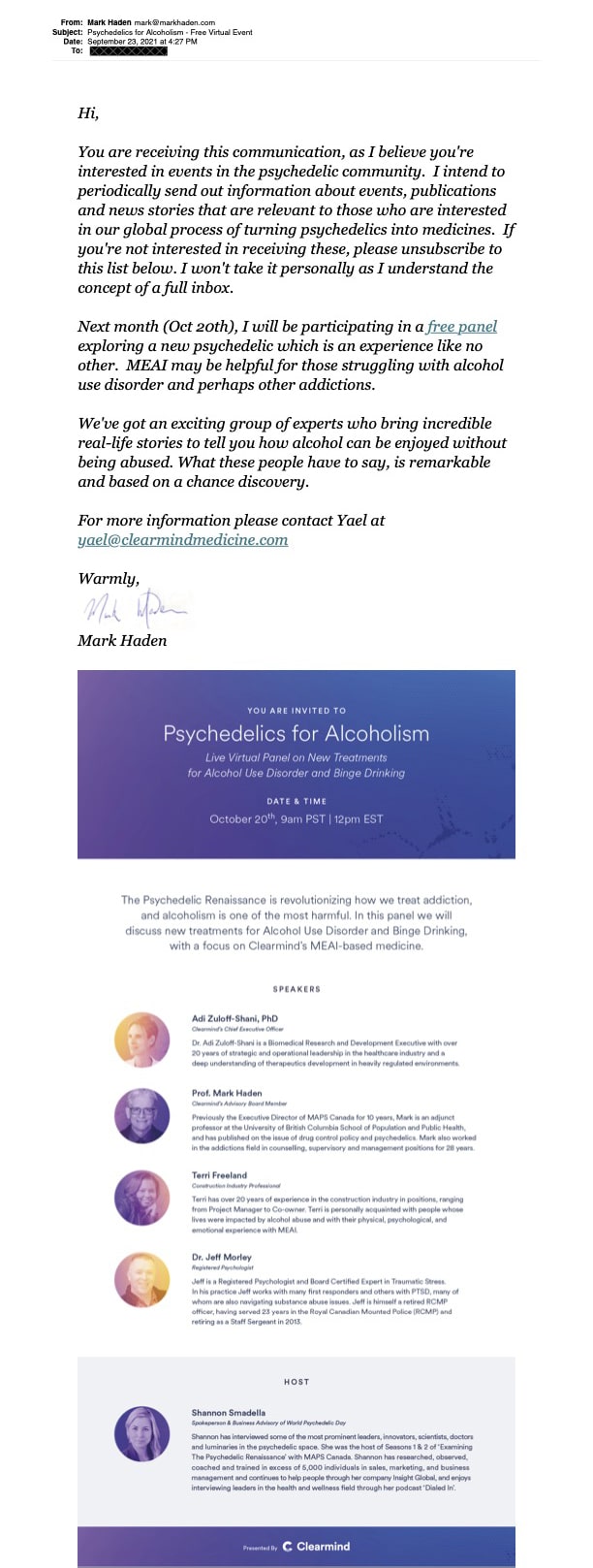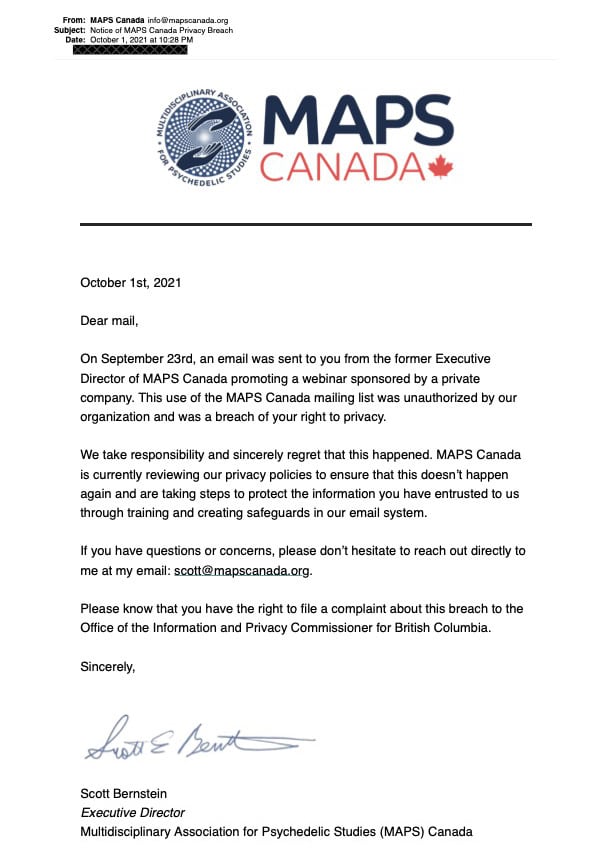MAPS Canada’s Data Breach Foreshadows Corporadelic Future
As the psychedelic pharmaceutical industry increasingly prioritizes personal data extraction through mobile apps, wearables, and so-called “targeted” medicine, a recent data breach by former MAPS Canada Executive Director Mark Haden provides a warning about some of the possible consequences to the financial incentives of datafication.

Psymposia is a 501(c)(3) nonprofit research and media organization that offers critical perspectives on drugs, politics, and culture. We rely on contributions from our readers and listeners. Your support is vital to sustaining Psymposia.
Support Psymposia’s independent journalism on Patreon and help us drive the Mystery Machine! We’re a bunch of meddling kids who are unmasking the latest shenanigans on the psychedelics beat.
Update 10/29/2021: Following Psymposia’s reporting on MAPS Canada’s data privacy breach (detailed below), Psymposia was made aware that MAPS Canada Executive Director has threatened to doxx an anonymous source who provided Psymposia with information. A full update on this situation has been amended to the end of this article*
On Sep 23, 2021, Psymposia staff received an email from the personal email account of Mark Haden — the former Executive Director of psychedelic nonprofit MAPS Canada and current Director of Clinical Trials for Psygen Inc. The email promoted a panel hosted by Clearmind Medicine, a company for which Haden sits on the advisory board.
“You are receiving this communication, as I believe you’re interested in events in the psychedelic community,” the email reads. “I intend to periodically send out information about events, publications and news stories that are relevant to those who are interested in our global process of turning psychedelics into medicines. If you’re not interested in receiving these, please unsubscribe to this list below. I won’t take it personally as I understand the concept of a full inbox.” The email went on to advertise a panel about using the drug MEAI to treat alcoholism.
It was not initially clear why Psymposia had received this email, having never signed up for a mailing list from Haden. Psymposia began receiving messages from others who had received this same unsolicited message and found a post on the r/PsychededicTherapy subreddit titled, “Anyone else getting unsolicited e-mails from Mark Hayden?”
🙋♂️Never signed up for @MAPSCanada ex-Executive Director Mark Haden’s (@markhadenblog) personal email list. But now receiving marketing emails from him advertising the new co he’s working with @ClearmindCMND https://t.co/rmRp69if5x pic.twitter.com/bCfSnrwML1
— Brian Normand (@diterpene) September 24, 2021
User Odd-Description1067 wrote: “So… has anyone else received unsolicited e-mail from Mark Hayden [sic], the former head of MAPS Canada? Did he swipe the MAPS Canada e-mail list before he left? Did they let him have it? Wtf? Privacy?”
When reached for comment about whether he had taken MAPS Canada’s email list with him upon leaving his position as Executive Director in early 2021, Haden told Psymposia that he had been “providing a free information service to a large list serve [sic] for a number of decades” — even before working for MAPS Canada.
“It started with sharing drug policy reform information and then morphed into harm reduction information and then morphed into psychedelics which I brought with me to MAPS Canada,” Haden said. “As I have had lots of requests to continue to provide this free service, I continue to make this available. The responses I have received are very positive. Anyone can either unsubscribe at the bottom of the list or ask me to remove their name.”
At the point that Haden offered this comment, noting that the responses he had received were “very positive,” Psymposia had already been made aware of negative responses that were sent to Haden.
When asked for a straightforward response to whether he took the MAPS Canada email list upon leaving his position as Executive Director, Haden did not respond. Nor would Haden acknowledge that during his tenure as MAPS Canada’s Executive Director, people subscribed to the MAPS Canada mailing list on the basis that it was attached to a popular nonprofit — not to Haden’s personal email list.
When MAPS was reached for comment, Director of Communications & Events, Betty Aldworth, told Psymposia that, “Mark Haden was and is not an employee of MAPS; MAPS Canada and MAPS do not share email lists. We have no comment on this matter.”
Aldworth justified this by claiming that MAPS and MAPS Canada are independent organizations, though Psymposia has scrutinized this notion before.

On October 1, Scott Bernstein — MAPS Canada’s new Executive Director — sent an email to the MAPS Canada email list titled, “Notice of MAPS Canada Privacy Breach.”
The email began by stating that the September 23 email from Haden was, in fact, an unauthorized use of MAPS Canada’s mailing list and “a breach of your right to privacy.”
“We take responsibility and sincerely regret that this happened,” Bernstein wrote. “MAPS Canada is currently reviewing our privacy policies to ensure that this doesn’t happen again and are taking steps to protect the information you have entrusted to us through training and creating safeguards in our email system.”
The message concluded by stating that Bernstein could be reached with questions or concerns at his MAPS Canada email address, and informed subscribers of their right to file a complaint about the breach to the Office of the Information and Privacy Commissioner of British Columbia.
 Unauthorized solicitation such as Haden’s is illegal in Canada under the Canadian Anti-Spam Law (CASL). This Canadian law states that after July 1, 2017, “senders will need express, fully informed, opt-in consents to send emails and other forms of commercial electronic communications to those message recipients.”
Unauthorized solicitation such as Haden’s is illegal in Canada under the Canadian Anti-Spam Law (CASL). This Canadian law states that after July 1, 2017, “senders will need express, fully informed, opt-in consents to send emails and other forms of commercial electronic communications to those message recipients.”
“Under CASL, the consequences for spammers include fines of up to $1M per violation for individuals and $10M per violation for companies,” according to email marketing service, MailChimp’s, CASL information page. “It’s important to note that individuals and companies, including directors, officers and other agents, are responsible and liable for the messages they send. Directors and officers have also been found personally liable for CASL violations.”
Following Bernstein’s email, Psymposia reached out to Haden for comment but did not receive a response. Psymposia then obtained email correspondence between Haden and a concerned individual, in which Haden offered a statement that generally minimized his breach of privacy.
The statement began by stating that, after some “soul searching,” Haden wanted to “clarify [his] perspective, intentions and lessons learned from this experience.” He then repeated the statement that he gave Psymposia, insisting that he started the mailing list prior to working at MAPS Canada.
“This email list was used when I started MAPS Canada in 2011,” Haden wrote. “This list grew in the context of MAPS Canada partly because people subscribed to it and partly because I referred people who approached me personally. After I left MAPS Canada, I used this list once to inform the community about a free event discussing a novel psychedelic (MEAI) that I believe will be extreemly [sic] useful for alcoholism. I did not discuss this with the MAPS Canada Board in advance.”
Haden noted that he received concerned messages from people who were confused as to why he had their email. He stated that he understands that they were concerned about how their contact information was being used.
“I now see that this was a breach of privacy,” Haden wrote. “I also speculate that the concern was that I used the MAPS Canada mailout list to promote a for-profit company that I may benefit from financially. I would like to acknowledge that I do receive payment as an advisor for this company.”
After noting this — that he is in fact paid by the company he promoted — Haden wrote that he wanted readers to know he was not motivated by financial gain.
He wrote that his time at MAPS Canada was evidence of his philanthropic priorities, since he volunteered when he started working with the organization and was “only paid a nominal wage at the end of [his] decade with MAPS Canada.”
Haden continued his statement by writing that he would like to acknowledge and apologize for “a number of errors [he] made in this process,” including not consulting MAPS Canada and not disclosing that he was a paid advisor to the company he was promoting.
“I would like to formally apologize for these errors and acknowledge that I will not be using this list again,” Haden said. “As I still believe information sharing is important, I discussed this process with the current ED of MAPS Canada – and he [Bernstein] has agreed to consider being the conduit [for] my future information sharing and they are now working on policies around this important issue.”
After reviewing this correspondence, Psymposia obtained a subsequent email exchange between Bernstein and a third-party in which Bernstein said that he “was unaware that Mark was sending a follow up ‘explainer’ email to people or naming me in that.”
Bernstein acknowledged the hybrid nature of Haden’s and MAPS Canada’s mailing lists, but said that “we determined that the list was, in fact, MAPS Canada’s and Mark’s individual use of it unauthorized.”
“He believed the list was his to use – since he had collected many of the names on there via his own website – and didn’t foresee the consequences of doing so for MAPS Canada,” Bernstein wrote. “It was a mistake of being naïve, rather being [sic] unethical, in my opinion. I realize that others may see it differently, but I distilled the facts I had learned in the manner and that’s the conclusion I came to. Despite Mark Haden’s use of the mailing list, we have an obligation to the people on the list to protect their information and we failed to do that. In turn, we are looking at our data policy and will train staff on how data should be handled.”
Bernstein did not clarify when “being naïve” becomes “unethical,” and Psymposia has noted Haden’s attempts to dodge criticism by claiming naivety in the past. As Lili Loofbourow notes in “The myth of the male bumbler,” “There’s a reason for this plague of know-nothings: The bumbler’s perpetual amazement exonerates him. Incompetence is less damaging than malice. And men — particularly powerful men — use that loophole like corporations use off-shore accounts. The bumbler takes one of our culture’s most muscular myths — that men are clueless — and weaponizes it into an alibi.”
Bernstein concluded his email by stating that Haden’s description of him as a “conduit for [Haden’s] future information” was inaccurate. The arrangement being considered, Bernstein wrote, is “not specific to Mark, but rather that MAPS Canada forward event notices agnostic to who is sending them — be they non-profit, corporate, etc. We don’t, as of yet, have a policy about that, but will evaluate the merit of having such a policy and providing this service. This is an ongoing issue.”
When Psymposia requested additional comments regarding the data breach and MAPS Canada’s possible “agnostic” sharing policy, Bernstein said, “Great to hear from you. I’d be happy to comment. Here’s my comment: ‘MAPS Canada does not comment on any policies that are not finalized or any confidential communications between individuals.’”
It is not clear how this is applied by MAPS Canada, though, as Bernstein had already made comments to an individual regarding policies that were not finalized. Psymposia was also made aware that Bernstein reached out to a private individual following our request for comment, directly referencing his email correspondence with Psymposia.
“I’m disappointed that you shared confidential communications with a reporter,” Bernstein wrote. “I find it ironic that people so concerned about ‘ethics’ are willing to breach ethics to achieve their desired end result. I [sic] any case, I don’t feel the need to share any further information with you in the future.”
It is unclear what ethics were breached in this situation, or how the sharing of an anonymous tip to a reporter is comparable to a former Executive Director taking peoples’ personal data from one job to another. Bernstein did not respond to Psymposia when asked for comment on the perceived breach of ethics.
As a professional organization whose reach intersects with vulnerable patient populations and criminalized populations of drug users, MAPS Canada has an ethical obligation to treat personal privacy concerns with the utmost care. People who offer their personal information to this organization do so with the understanding that their information will be kept safe. Many people — if exposed as having an interest in psychedelic drugs or struggling with mental health issues — may face criminalization or stigma in other areas of their lives.
As the psychedelic pharmaceutical industry increasingly prioritizes data extraction via mobile apps, wearables, and so-called “targeted” medicine, breaches of user privacy and misuses of personal information are likely to become commonplace.
Privacy breaches, as highlighted by former MAPS Canada Executive Director Mark Haden, offer warnings about some of the possible consequences of the financial incentives of datafication.
For more on surveillance and digital capitalism:
Digital Psychedelia: Hidden Experience and the Challenge of Paranoia by Tehseen Noorani
Plus Three #45 – Part Two: Digital Capitalism on Psychedelics with Emma Stamm
*UPDATED 10/29/21: Following Psymposia’s reporting on a recent MAPS Canada data privacy breach, Executive Director Scott Bernstein has threatened to doxx an anonymous source that reached out to Psymposia.
During Psymposia’s reporting on this data privacy breach — committed by the organization’s former Executive Director, Mark Haden — we received a tip from a concerned individual who wished to remain anonymous.
This individual shared a number of correspondences between themselves and Haden which contradicted many of Haden’s public statements.
The individual also shared emails between themselves and current MAPS Canada Executive Director, Scott Bernstein, which seemed to downplay Haden’s role in the privacy breach and hint at a revised information sharing policy at MAPS Canada.
When Psymposia reached out for comments about potential revisions to MAPS Canada’s sharing policy, Bernstein told Psymposia he had no comment, and proceeded to reach out to the anonymous source to express disappointment in their sharing of correspondence with journalists at Psymposia.
Bernstein implied that anonymously sharing emails from the Executive Director of a nonprofit with journalists was equivalent to MAPS Canada’s privacy breach, in which the former Executive Director took people’s personal information from one organization to another.
Following the publishing of Psymposia’s story, the anonymous source reached out again, noting that Bernstein has threatened to doxx them.
“I’m considering sharing the fact with the public that it was you who was the “third party” and that you shared these personal emails with a reporter. Some important information that was missing from the story,” Bernstein wrote.
Psymposia takes the privacy and anonymity of sources very seriously when confidentiality is requested, and we received the tip from a source who wished to remain anonymous. Bernstein’s assertion that important information is missing is untrue. Revealing the identity of the source does not alter the information he freely shared with them.
While reporting on the breach, Psymposia reached out to Bernstein for additional comment. He stated, “Great to hear from you. I’d be happy to comment. Here’s my comment: ‘MAPS Canada does not comment on any policies that are not finalized or any confidential communications between individuals.’” Psymposia also followed up with Bernstein after learning that he reached back out to the source and told them, “I find it ironic that people so concerned about ‘ethics’ are willing to breach ethics to achieve their desired end result. I [sic] any case, I don’t feel the need to share any further information with you in the future.”
Psymposia offered Bernstein a space to elaborate on his perceived breach of ethics but never received a response.
In discussing Bernstein’s attempted intimidation with Psymposia, the source said, “Thanks for calling it what it is (doxxing), that helped me understand my reaction and feel a little less crazy. A friend of mine got doxxed by a neo-Nazi group a long time ago and it was really scary. He left town and basically disappeared for a good long while after that.”
Doxxing is an aggressive tactic linked to real-world violence by reactionary groups. Psymposia takes threats towards its sources seriously and does everything in its power to protect and advocate for those sources. MAPS Canada’s work involves caring for highly traumatized populations who have been given drugs that make them even more vulnerable. This type of intimidation is unacceptable and causes real harm.
Hey! Before you go… Psymposia is a 501(c)(3) non-profit media organization that offers critical perspectives on drugs, politics, and culture. We strive to ask challenging questions, and we’re committed to independent reporting, critical analysis, and holding those who wield power accountable.
Our perspectives are informed by critical analysis of the systemic crises of capitalism that have directly contributed to the unmitigated growth of addiction, depression, suicide, and the unraveling of our social relations. The same economic elite and powerful corporate interests who have profited from causing these problems are now proposing “solutions”—solutions which both line their pockets and mask the necessity of structural change.
In order for us to keep unpacking these issues and informing our audience, we need your continuing support. You can sustain Psymposia by becoming a supporter for as little as $2 a month.





